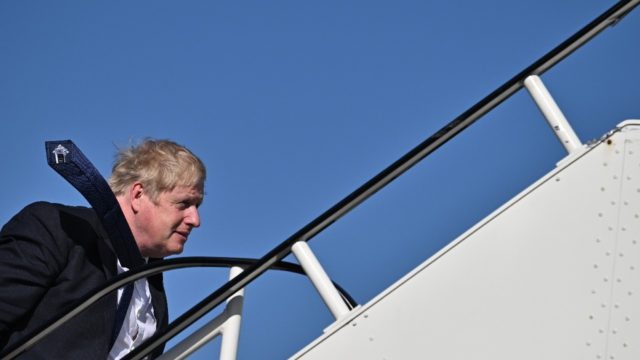British Prime Minister Boris Johnson faces a test of Conservative party loyalty Thursday as MPs vote on launching a parliamentary probe into whether he misled them over the “partygate” scandal.
Johnson repeatedly denied in the House of Commons that he or his Downing Street staff had breached Covid-19 lockdown laws, after allegations of widespread rule-breaking emerged late last year.
But last week he became the first UK leader to be fined for breaking the law, as police confirmed they had issued dozens of penalty notices to his staff as part of an ongoing investigation.
Johnson’s single fine is related to an office gathering for his birthday in June 2020, when Britain was under a pandemic lockdown.
But penalties for other events could follow, and opposition parties are now demanding parliament’s cross-party “privileges committee” investigate Johnson’s statements to the Commons.
It has the power to sanction lawmakers if they are found guilty of offences, including suspending them from the Commons.
However, the committee can only launch an investigation if a majority of MPs vote for a referral.
The main opposition Labour party has urged Conservatives to back its call for the panel to assess whether Johnson’s denials amounted to “contempt of the House”, with a vote set for late afternoon Thursday.
In response, the government initially ordered Tory MPs to support an amendment delaying any decision on a probe until the police investigation has ended and a civil service report on the scandal has been published in full.
But in an abrupt U-turn minutes before the Commons began debating the issue, it ditched the amendment and appeared set to allow Conservatives a so-called free vote.
The drastic reversal raised questions about the degree of support for the government’s delaying tactics among its own 359 lawmakers, and contrasted with comments earlier Thursday by Johnson himself.
“I’m very keen for every possible form of scrutiny… but all I would say is I don’t think that that should happen until the investigation is completed,” he said on a visit to India.
“I think what people should have is the full facts and in the meantime what I want to do is get on with the job.”
‘Important step’
Labour’s bid for a probe into Johnson’s statements to parliament requires dozens of Conservative MPs to vote for it, and would represent a worrying rebellion for the embattled British leader.
However, if Tory lawmakers stand by him and reject the motion they risk being named and shamed by opposition parties ahead of local elections next month.
Opening the debate, Labour leader Keir Starmer said the vote should pass “to uphold” parliament’s principle of “honesty, integrity and telling the truth”,
“It is a principle under attack, because the prime minister has been accused of repeatedly, deliberately and routinely misleading this House over parties held in Downing Street during lockdown,” he added.
Johnson has repeatedly apologised over the scandal but remains adamant he never knowingly misled parliament, and has vowed to press on with issues including the war in Ukraine.
He also told The Sun newspaper that he would fight the next general election, saying “not a lot of circumstances spring to mind” in which he would quit.
But one junior minister resigned last week following the police fine, while senior Tory backbencher Mark Harper told parliament Tuesday that Johnson was “no longer… worthy” of being prime minister.
A drubbing for the Conservatives in the local elections on May 5 could significantly add to his woes, if more Tory MPs join the likes of Harper in demanding a leadership vote.
One national survey this week found around two-thirds of the public spoke negatively about Johnson, compared to just 16 percent positively, with the word “liar” the most commonly shared response.

COMMENTS
Please let us know if you're having issues with commenting.